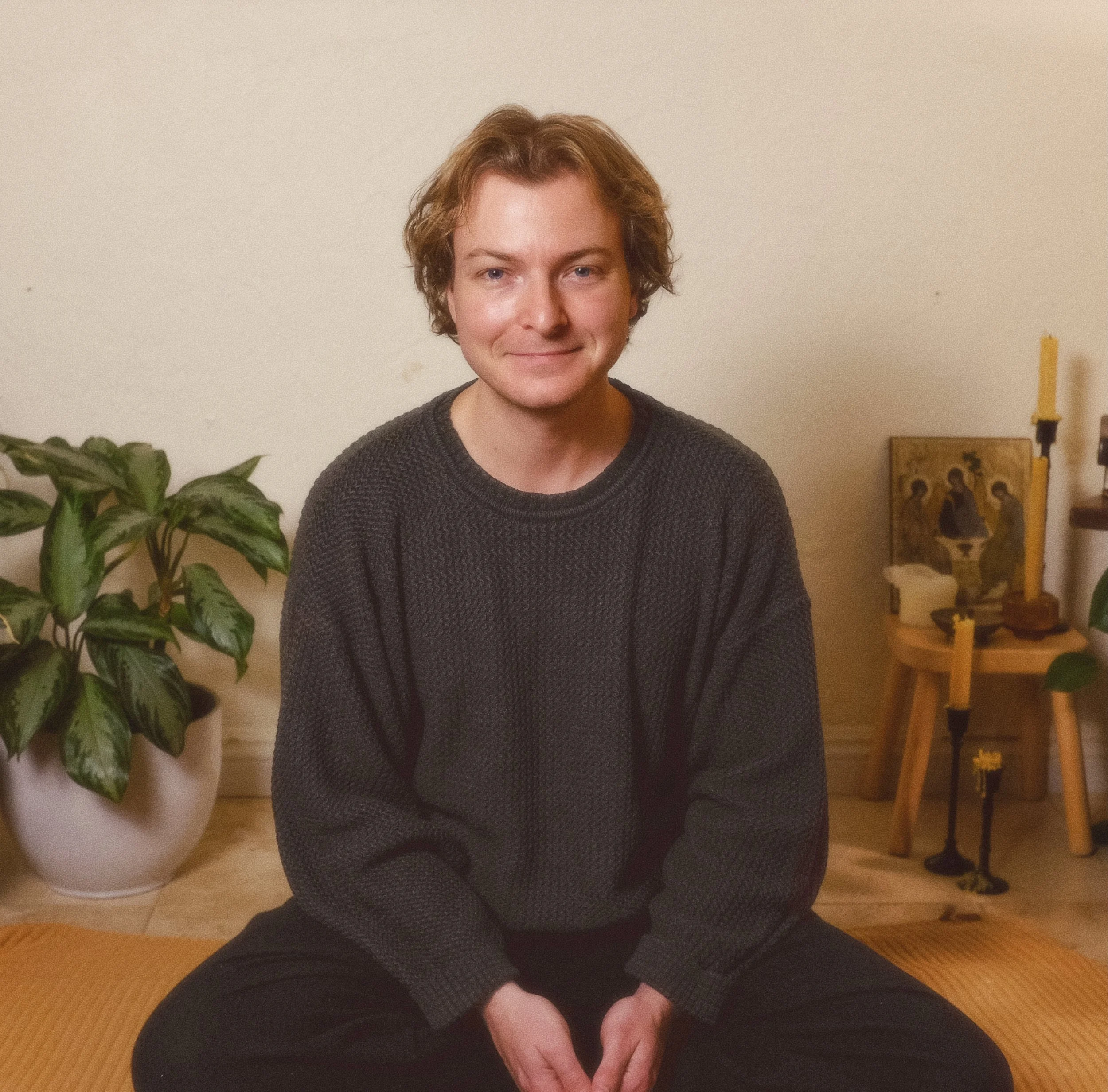Psychotherapy & Coaching
Two Distinct Paths,
One Unified Approach
Whether you're seeking psychotherapy or coaching, my approach remains consistent: relational, integrative, embodied, and informed by my spirituality. Both paths honor the whole person — body, mind, heart, & relationships — facilitating healing and growth through safety, connection, and attunement.

How I Practice
A Process-Focused, Body-Integrated Approach to Healing
My Philosophy of Care
My approach flows with rather than fights against our natural design to move toward integration, connection, and healing. I believe that restoration happens best within safety, relationship, and sacred timing. Just as the nervous system requires conditions of felt safety to come out of survival mode, the soul, too, needs gentleness and grace to unfold.
In our work together, we co-create a relational field where your body doesn’t need to brace or perform. This is where healing begins: not through force, but through attunement. By honoring the pace of your nervous system, the presence of the Holy Spirit, and the protective parts that show up along the way, we move gently toward the deeper truths within you.
This work is:
Trauma-attuned: grounded in an understanding of how the body holds memory, defense, and longing
Polyvagal-informed: centered on supporting nervous system regulation and re-patterning through co-regulation, breath, voice, and movement
Parts-aware: honoring the adaptive roles of inner parts while fostering integration and healing
Faith-informed: when appropriate and you request it, we can bring your faith and spirituality into the process
I’m rooted in the body because the body is not separate from the soul—it’s the place where God dwells with us.
I’m centered in Christ because His Presence is the source of all true healing.
I uphold the primacy of presence because connection is what makes healing possible.
This is the ground I stand on.
This is the invitation: to come as you are and to let your healing unfold with the care, safety, and sacredness it deserves.
A Humanizing, Depathologizing Lens
I often challenge modern and cultural assumptions gently, respectfully, and creatively as a mindful Catholic committed to restoring dignity to our healing journeys. I bring a pioneering, trauma-informed, and deeply humanizing stance that does not reduce people to symptoms but honors the full story of their nervous systems, attachments, wounds, longings, and desires.
What Sessions Often Include
Body-based grounding and resourcing — practices like breathwork, orienting, or gentle movement to help your nervous system settle and build internal safety
Bilateral activation — such as tapping or rhythmic movement, to support integration and regulation across brain and body
Creative expression — like non-dominant hand drawing or image-making, to access deeper parts of your story beyond words
Inner healing prayer (when requested) — gently welcoming Jesus into painful or fragmented places through presence-based, Spirit-led prayer
Imaginative prayer and theological reflection — to help you reconnect spiritually and make meaning through the lens of your faith
Between-session practices — simple invitations to help you integrate insights, regulate your system, and practice new ways of being
Throughout our work, we move with titration (one small step at a time) and pendulation (gently shifting between areas of difficulty and safety), so that your healing can unfold at the pace your body, story, and spirit are ready for.
Which Path is Right for You?
Psychotherapy
(for California Residents)
As a therapist, I offer more than treatment—I offer accompaniment through the terrain of trauma, mental health, and emotional suffering. My clinical work is grounded in relational depth, spiritual attunement, and a body-centered awareness that unfolds slowly, safely, and in God’s time.
Psychotherapy is appropriate if you’re seeking formal support for symptoms related to:
PTSD or Complex Trauma
Anxiety or Depression
Dissociation or Attachment Wounds
Addictions or Unwanted Behaviors
Emotional Dysregulation or Chronic Stress
In this space, I provide diagnosis, treatment planning, and documentation as a registered Associate Professional Clinical Counselor and Associate Marriage & Family Therapist, under the supervision of Dr. Sean Tobin, PsyD (#33387). While clinical, this work is far from cold or formulaic. My approach is one of reverence: to witness, honor, and gently guide the process of restoration within your mind, body, and spirit.
Just like in my guidance work, we move slowly. We listen deeply. And we tend to your story with gentleness, curiosity, and prayerful presence. The difference lies not in the heart of the work—but in the scope, responsibility, and structure of psychotherapy as a licensed mental health service.
Integrative Coaching
(for Worldwide Clients)
For those outside California or not seeking clinical treatment, I offer non-clinical integrative coaching and accompaniment focused on:
Body-centered integration & nervous system work
Deep inner healing through Catholic-integrated somatic parts work
My Incarnational Healing practices & framework
Integration of the whole person: body, mind, soul, and relationships
Like therapy, my coaching is a place of sacred listening and presence. But unlike therapy, my coaching is not clinical: there is no diagnosis, treatment plan, or medical record. Instead, this is a relational, somatic, and faith-informed space for discerning, integrating, and reconnecting to what’s stirring within you.
Coaching may be a better fit if:
You are not seeking treatment for a mental health diagnosis
You want to explore your faith, embodiment, and healing outside a clinical frame
You’re looking for a space that honors your story with spiritual and somatic care
You need accompaniment that is relational, restorative, and rooted in Christ, but outside the medical model
Here, I’m not your therapist. I’m your coach and companion. We walk together with compassion, humility, and a listening ear for both the nervous system and the whisper of the Holy Spirit. The process remains slow, sacred, and safe—just as it is in therapy—but the container is different.
In Summary
Both offerings share:
A deep respect for your story, symptoms, and Catholic spirituality
Somatic, parts-based, and trauma-aware practices
A slow, sacred pace of unfolding—not fixing
Integration of Catholic theology, prayer, and nervous system science
A commitment to presence over pressure
The main distinction is in the scope and intent:
Psychotherapy offers clinical treatment for mental health challenges and includes formal assessment, diagnosis, and progress planning.
Integrative Coaching offers non-clinical accompaniment for those seeking integration, clarity, or spiritual support outside the medical model.
If you have questions, feel free to reach out for a 15-minute clarity call or send me a message.
Who I work well with
You might not have the perfect words for what’s wrong, but you know something’s hurting, stuck, or longing to be met.
I work well with people who are:
Healing from PTSD, Complex PTSD, trauma-related anxiety, depression, compulsive behaviors, and addictions
Trapped in cycles of overthinking, perfectionism, or self-abandonment
Feeling too much or nothing at all
Craving connection, but unsure how to stay in it without fear or shame
Sitting in pews or far from them, aching for more of God but unsure how to reach Him
Polished on the outside, but carrying wounds that feel unmet, unseen, or unbearable
Deeply empathic, often caring for everyone but themselves
Torn between longing for home and longing to escape
Frozen in fear of being fully themselves—yet yearning to breathe freely, to be loved as they are
I hold space for the disillusioned, the devoted, the curious, the burned-out, and the brokenhearted—because I’ve been there, too. And because I believe healing is possible, and belonging is your birthright.
Testimonials
My Education
Master of Science in Clinical Mental Health Counseling, Divine Mercy University
Bachelor of Arts in Humanities and Catholic Culture, Franciscan University of Steubenville
Certified Domestic Violence Counselor Training
Certified Sexual Assault Counselor Training
Treating Complex PTSD with Internal Family Systems Training by Frank Anderson, MD
Nurturing the Heart with the Brain in Mind: A Year with Bonnie Badenoch Training
Treating Trauma & Addiction with the Felt Sense Polyvagal Model Training by Jan Winhall
The Power of Polyvagal Training by Deb Dana
Modalities I draw from
Personalism
Person-Centered Therapy
Interpersonal Neurobiology
Polyvagal Theory
Focusing Psychotherapy
Internal Family Systems
Existential Psychotherapy
Sensorimotor Psychotherapy
Somatic Psychology
Baars-Terruwe Method
Trauma-Focused Cognitive Behavior Therapy
Accelerated Experiential Dynamic Psychotherapy
Gottman Theory
Emotionally Focused Therapy
Let’s Talk
Ready to book? Not ready at all? Want to send a little message before you change your mind? Fill out the form below. No stakes, no pressure, just a tiny act of momentum. I’ll meet you there.
Join the community
Musings, nervous system tools, recorded practices to support your healing journey. Algorithm free.








